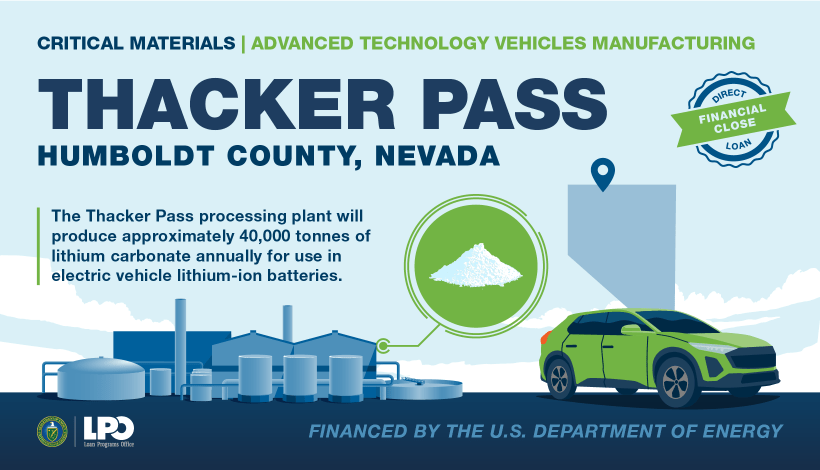U.S. Energy Department Finalizes $2.26 Billion Loan to Lithium Processing Plant in Nevada

The U.S. Energy Department on Oct. 28 announced the closing of a $2.26 billion loan to Lithium Americas Corp. to build a lithium processing facility in Humboldt County, Nevada. Once in operation, the facility will have an annual production capacity of 40,000 tonnes of lithium carbonate. As lithium is a key mineral used for electric vehicle batteries, the site could facilitate the production of 800,000 EV batteries per year, translating to about 317 million gallons of gasoline avoided annually.
The project site is close to the Thacker Pass lithium mine, the largest known lithium deposit in the U.S. The mine has a proven reserve of 3.3 million metric tons of lithium carbonate equivalent and has a minimum lifespan of 40 years, according to Lithium Americas.
The company started constructing the facility in March 2023 after receiving approval from the U.S. Interior Department. While the facility will have an annual production capacity of 40,000 tonnes during the first phase, this number is expected to double during the second phase. General Motors is the primary buyer for the project, with an offtake agreement for 100 percent of the annual 40,000-tonne production volume for 20 years, during the first phase. The company’s offtake deal will also include 38 percent of the production volume for another 20 years during the second phase, with the right of first offer for the remaining production volume during that phase.
The department will administer the loan through the Advanced Technology Vehicles Manufacturing Loan Program, which provides project financing for the domestic production of advanced technology vehicles. With Nevada being a key location for lithium deposits in the U.S., the department aims to invest in many projects in the area. In January, the department offered a conditional loan guarantee of $700 million to the Rhyolite Ridge project. Operating at full capacity, this site could support the production of 370,000 EV batteries.
The project supports the Biden administration’s goals for transportation sector decarbonization. In 2023, 16 percent of all light-duty vehicles sold were ZEVs. The administration’s target is for EVs to reach 50 percent of all car sales in 2030.
Building a sustainable and reliable domestic supply chain for critical materials is also a key objective. A domestic supply chain would improve energy security and make U.S. manufacturing more competitive against countries like China, which currently owns a significant share of the global supply of critical materials.
EnerKnol Pulses like this one are powered by the EnerKnol Platform—the first comprehensive database for real-time energy policy tracking. Sign up for a free trial below for access to key regulatory data and deep industry insights across the energy spectrum.
ACCESS FREE TRIAL